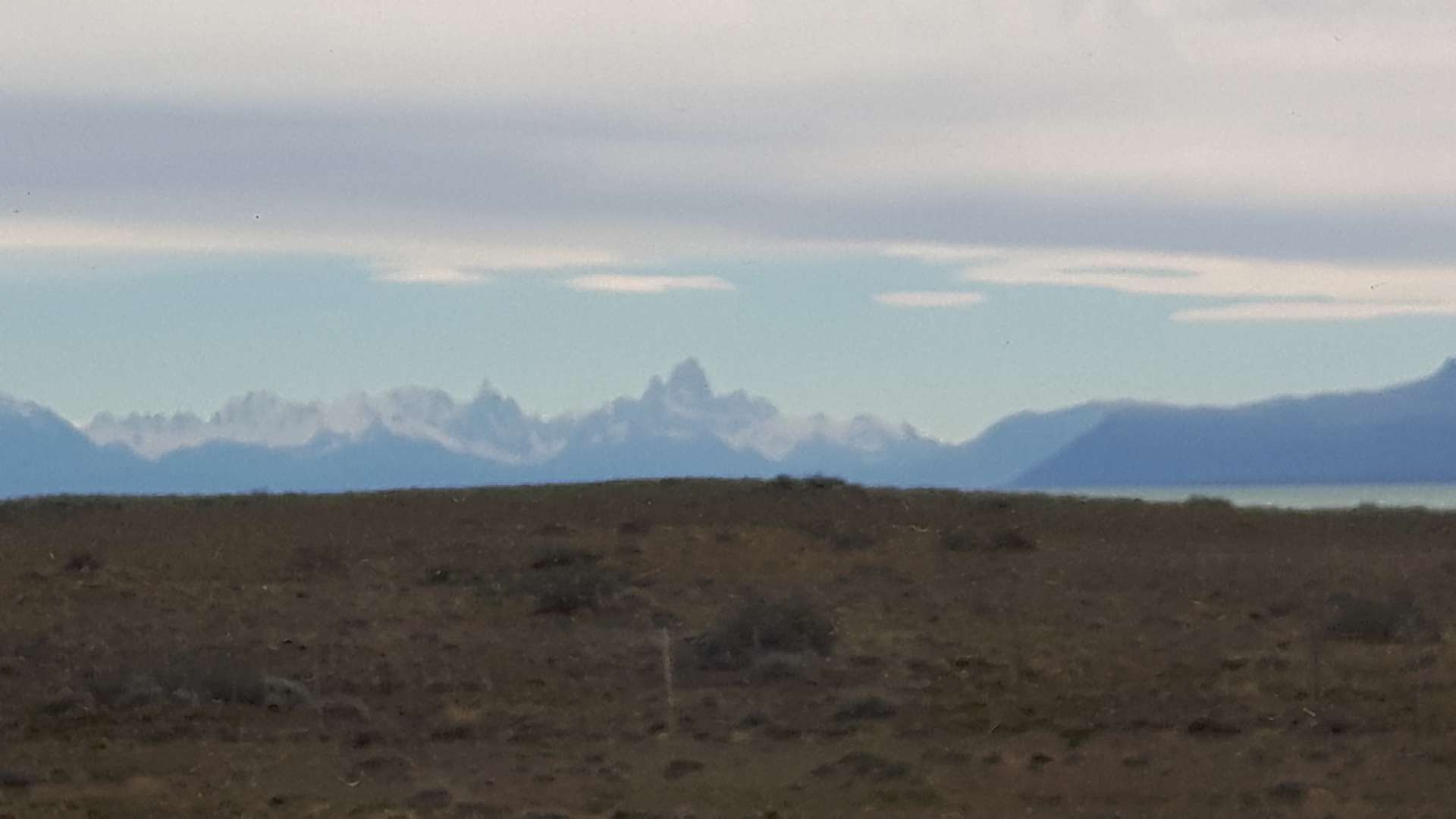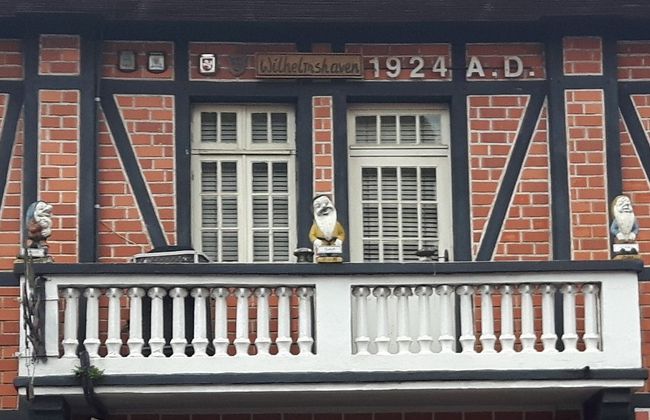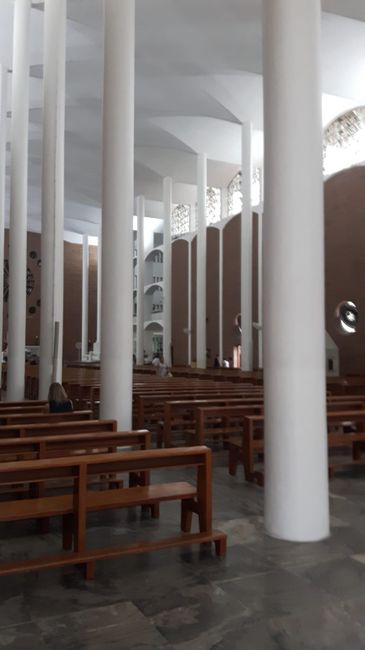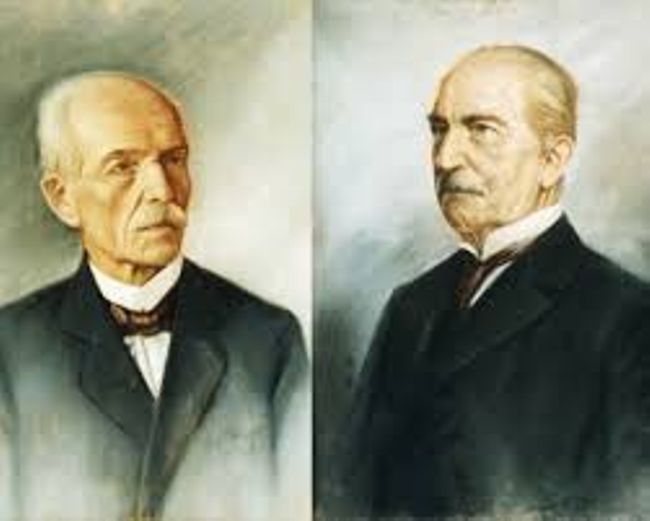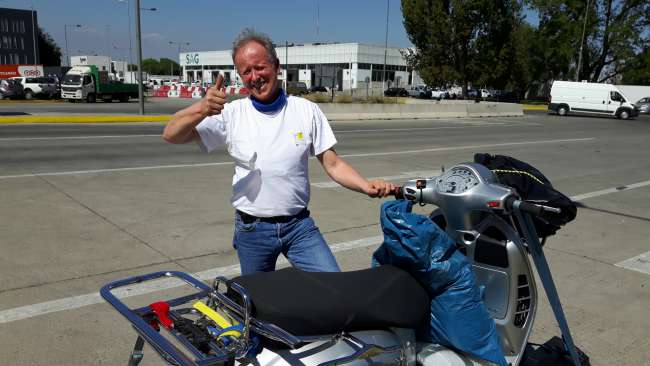
2017 VespamerikasuR 2019
vakantio.de/vespaamerikasur
from 18.01.: Blumenau / SC Capital of Beer
Dɛn dɔn pablish am: 20.01.2019
Sabskrip to Nyusleta
18.01.:
Today I woke up early. Rodrigo takes advantage of the quietness of the house to clean the floor. He works very efficiently. He uses a spray bottle filled with water and cleans the room in a systematic way. He sprays the floor and then wipes it. No streaks - everything looks perfect.
The cottage is fully booked. Three daughters with their older mother and two children have arrived from Sao Paulo and are on vacation. So I timed my departure well.
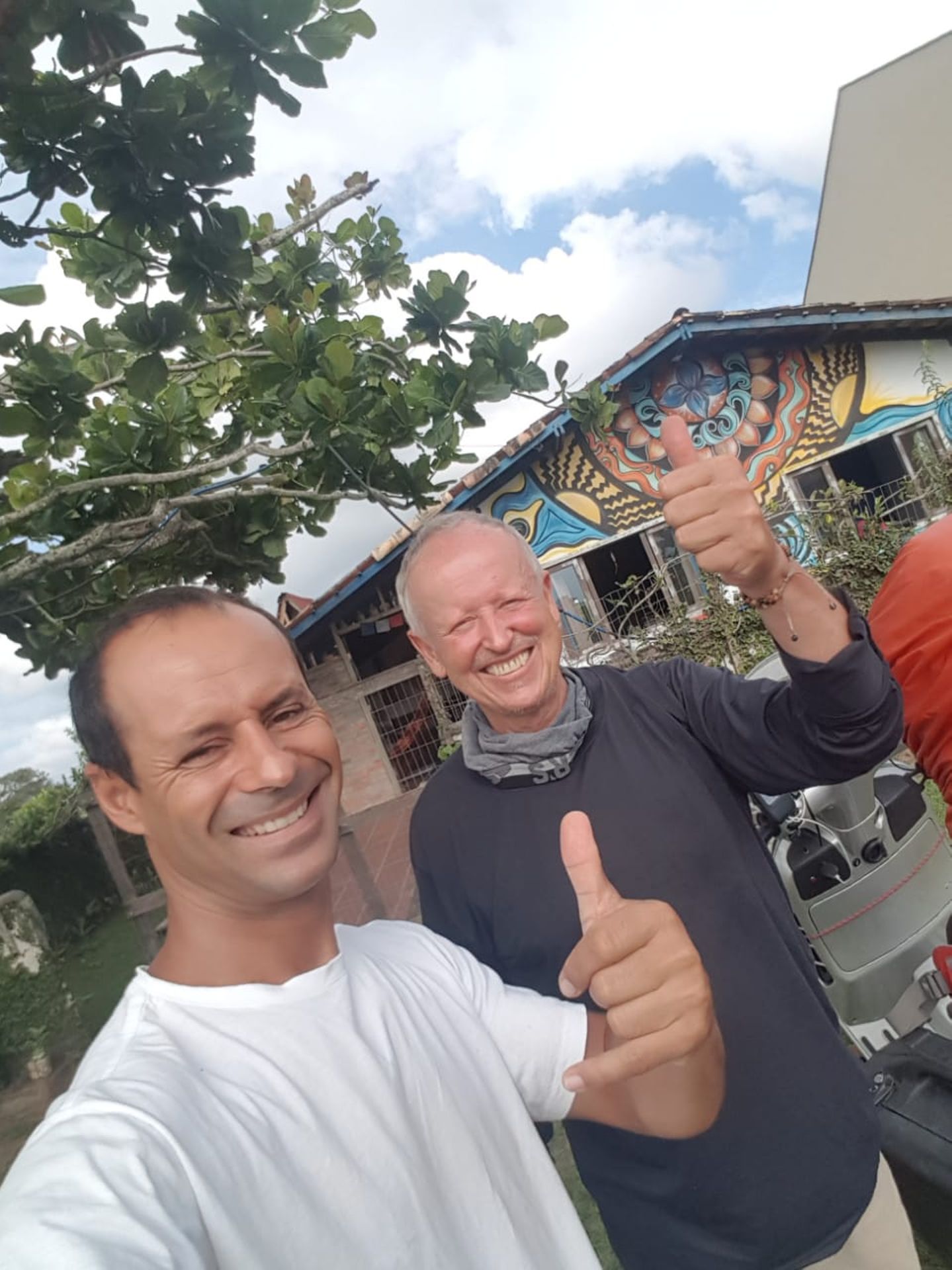
amigo, my friend...
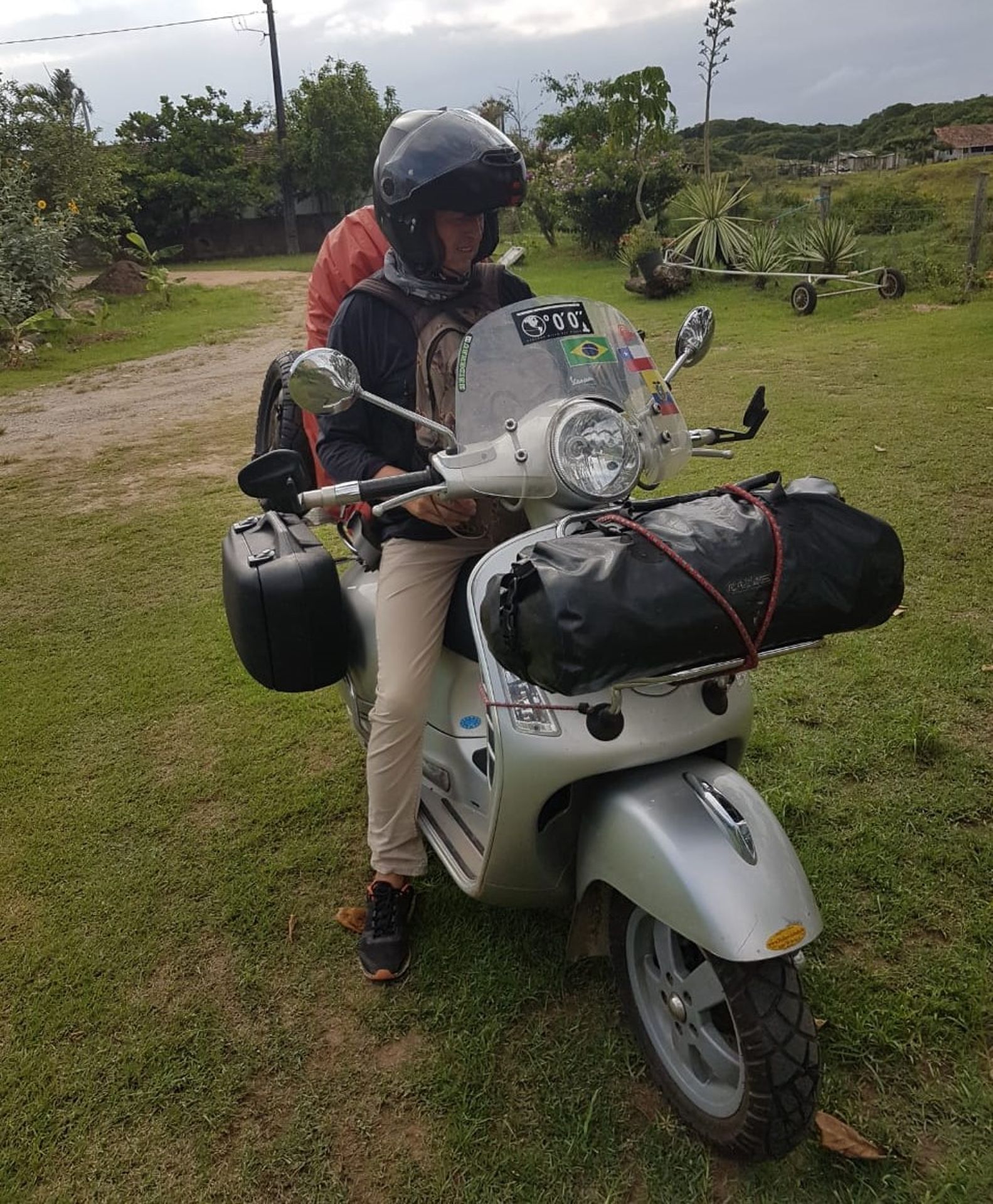
activate the GPS and go
When saying goodbye, Rodrigo calls me his friend and says that if I want to come back, there will always be a bed available for me. He says that it's better to come during the winter season, when there are fewer tourists and it's not so hot. Well, that's an option I think. We take some pictures and then hit the road.
It's still a bit cloudy and not very warm. The highway is as crowded as the A7 on a Friday afternoon. It's the coastal route, and the next major city after about 150 km is Florianopilis. Luckily, my route turns towards Blumenau before that. The traffic is heavy, a VW Polo drives to the right of me in stop and go, rolls down the window and wants to know if I really come from Europe. We can only talk briefly because the traffic starts moving again. He continues the conversation at the next stop. He wants to take pictures and send them to his friend in Germany.
I hope to encounter less traffic on the federal road to Blumenau. The sun has made its way through the clouds. The drive is bearable, as clouds keep blocking direct sun. The traffic remains heavy. The rather narrow federal road is one big construction site. It is getting a second lane and will eventually become two lanes. It's half past twelve. It's the only chance during the day to dive into a salad and raw food buffet with delicious potato salad in Brazil.
There is even a dessert buffet that is constantly being replenished. The whole pleasure costs about 8 euros, including a pack of cigarettes. And we are in southern Brazil! For those who want more meat, waiters with huge meat skewers and a big knife serve them. The guest can choose their piece of meat. The sharp knife cleanly cuts the meat and is skillfully placed on the plate. I stay away from it.
When I come out again, the temperature has probably risen by 10 degrees. I look forward to the refreshing breeze. Subtropical climate awaits me here.
The states of Santa Catarina and Rio do Sul are the most frequented areas by immigrants. There was an influx in the mid-19th and early 20th centuries. Emperor Pedro I, who ruled the country for 50 years and managed to break free from Portugal, gave the green light. Those who wanted to come could buy land for little money and didn't have to pay taxes for 10 years. A total of nearly 6 million people emigrated from the European continent to South and North America. I remember the film by Edgar Reiz, "The New Homeland," which describes the hopeless situation in the Hunsrück and how the only solution is to emigrate to America.
A large sign with white letters on a brown background welcomes us to Vale Europeu, and shortly after I read "Welcome to Blumenau!"
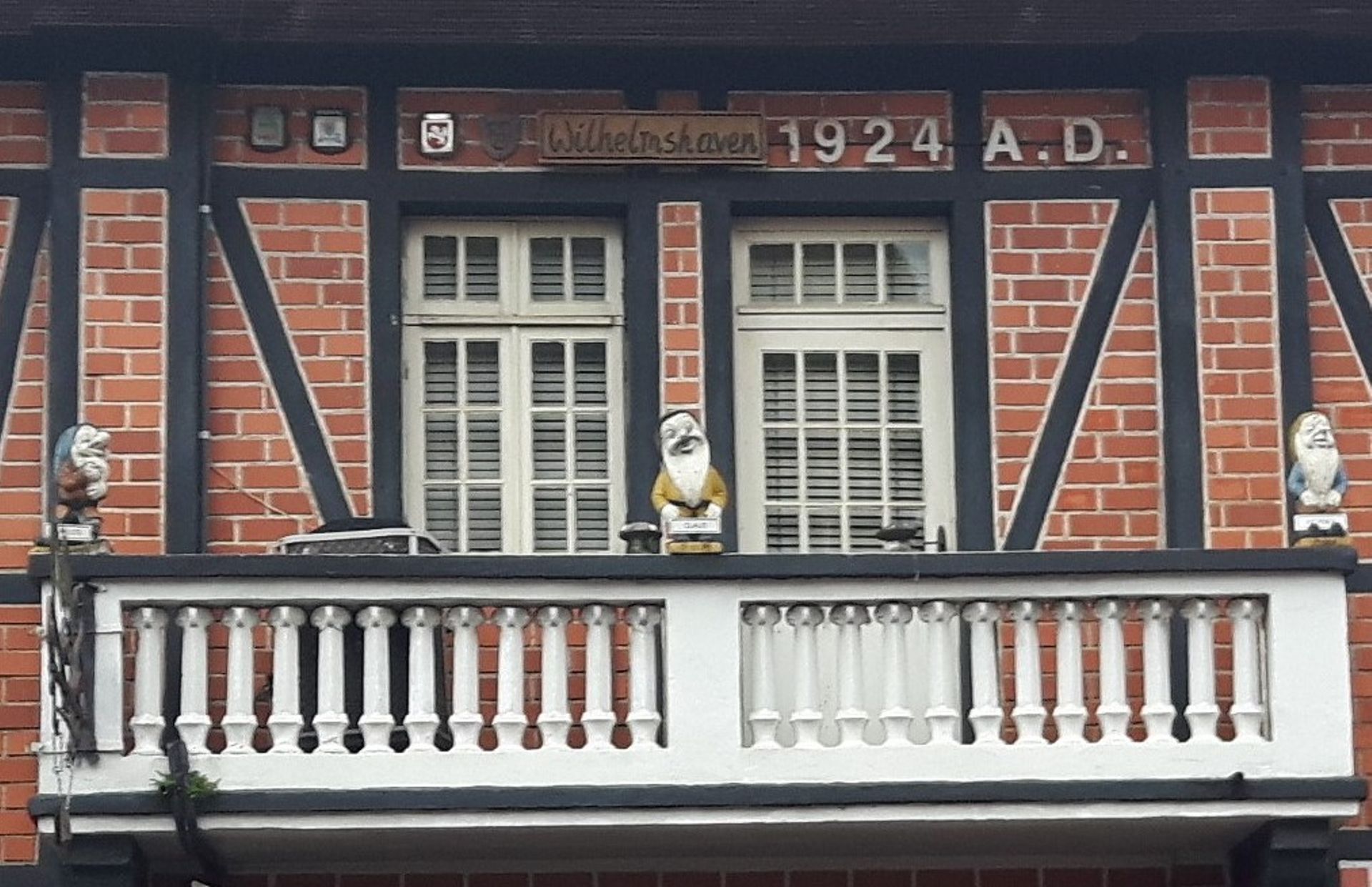
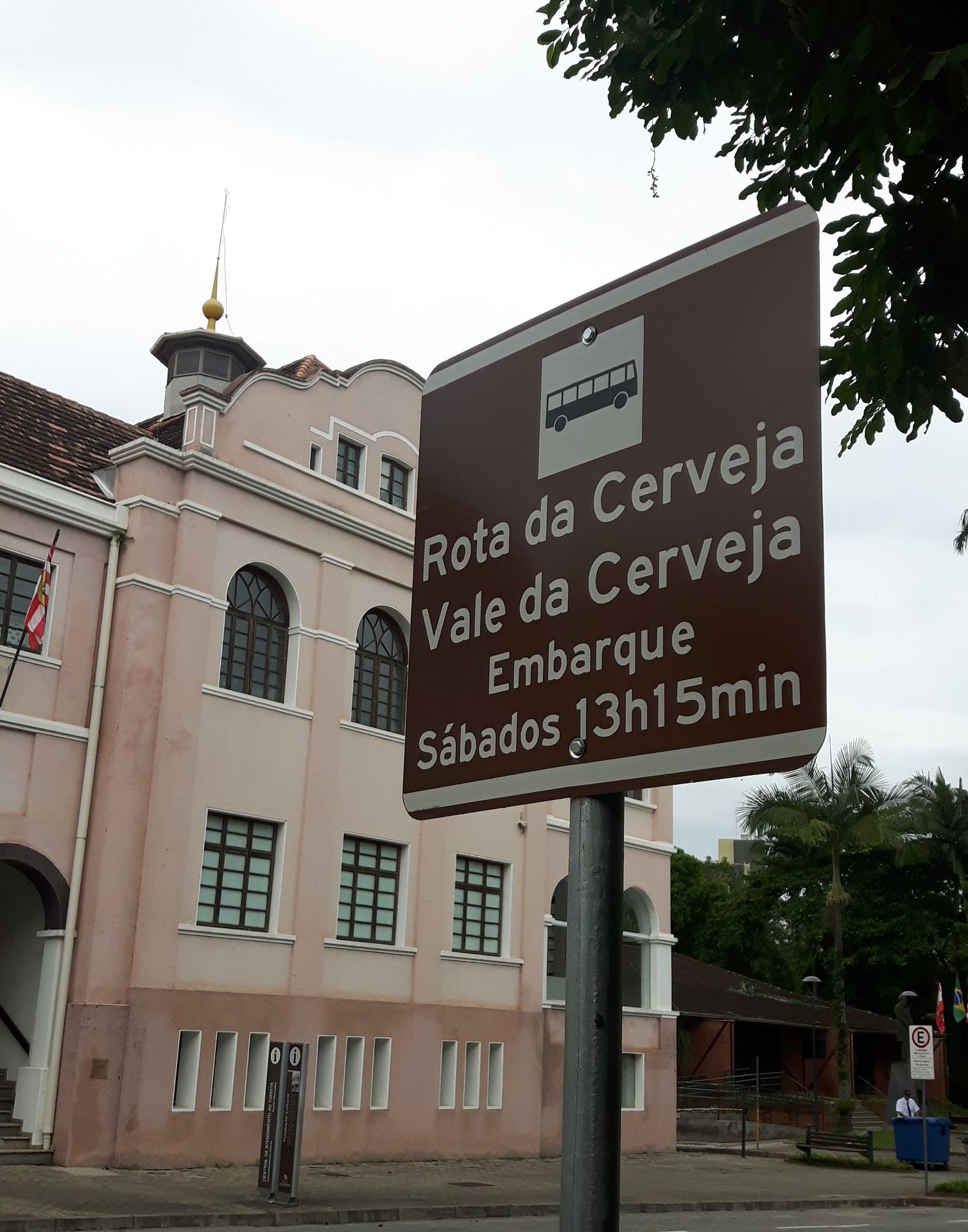
Only on Saturdays at 1:15 pm the bus drives along the beer mile entlang.
In the background the town hall built in 1875
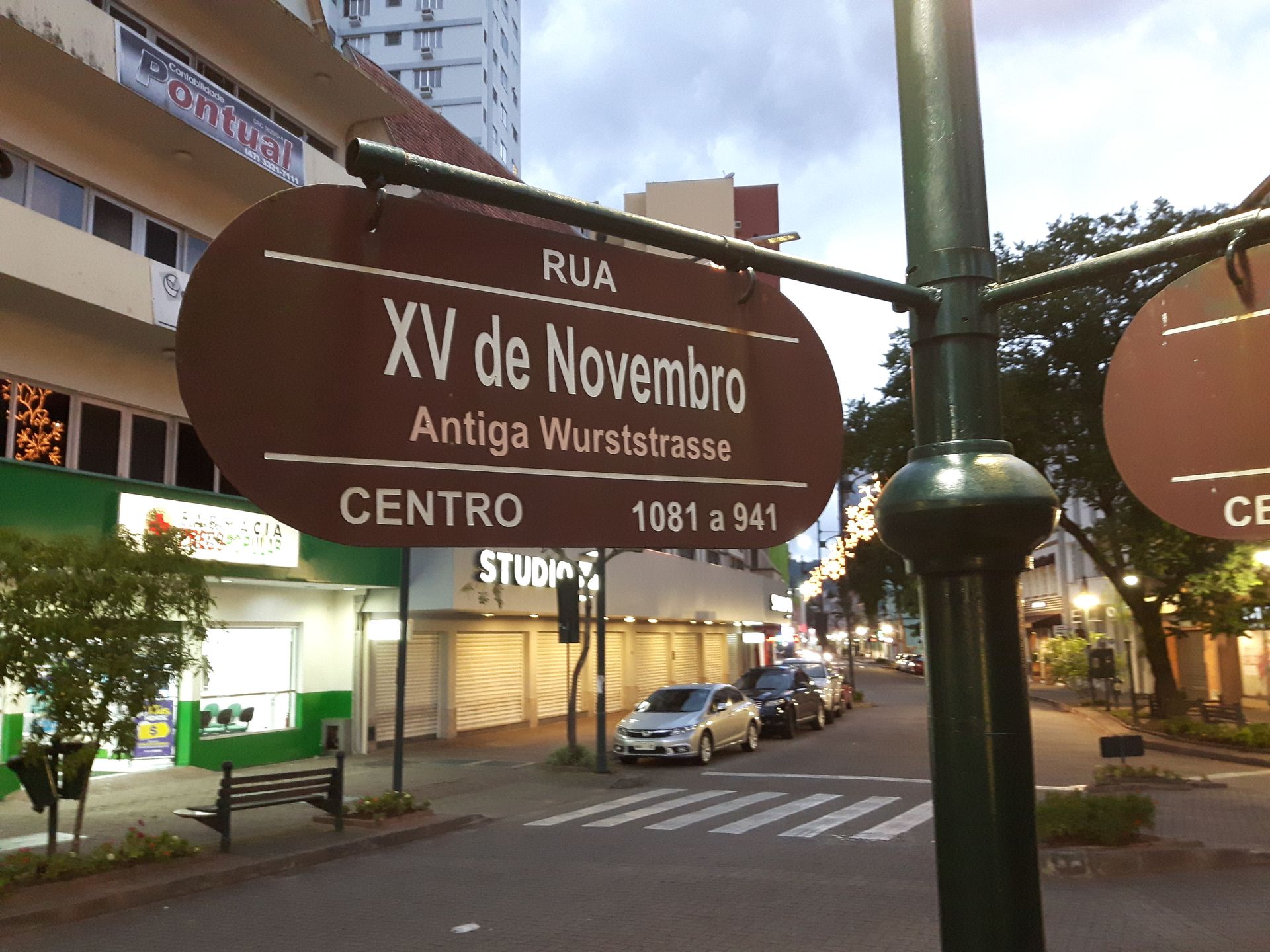
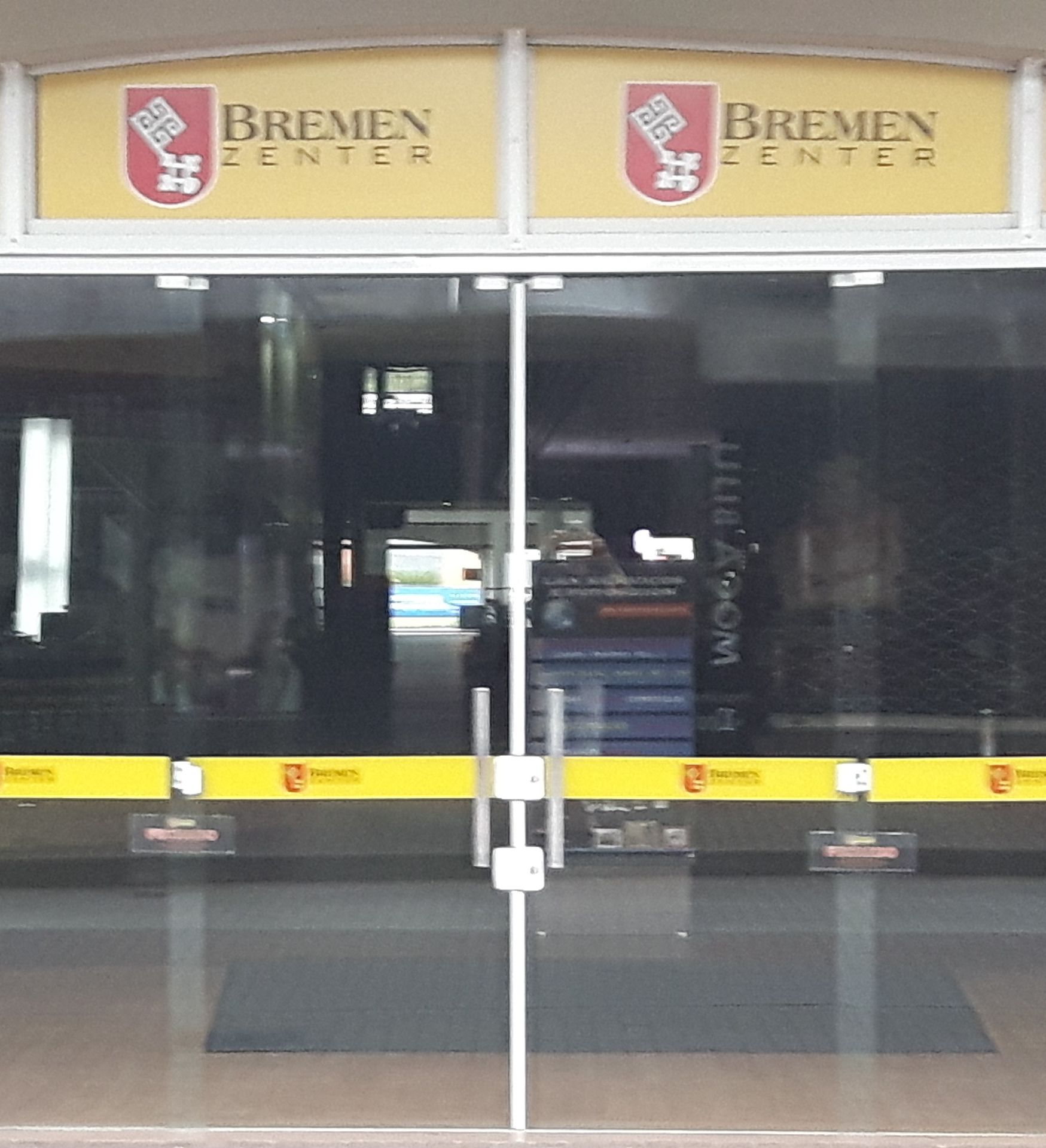
Does the German language reclaim Anglicisms? Center spelled with 'z'?
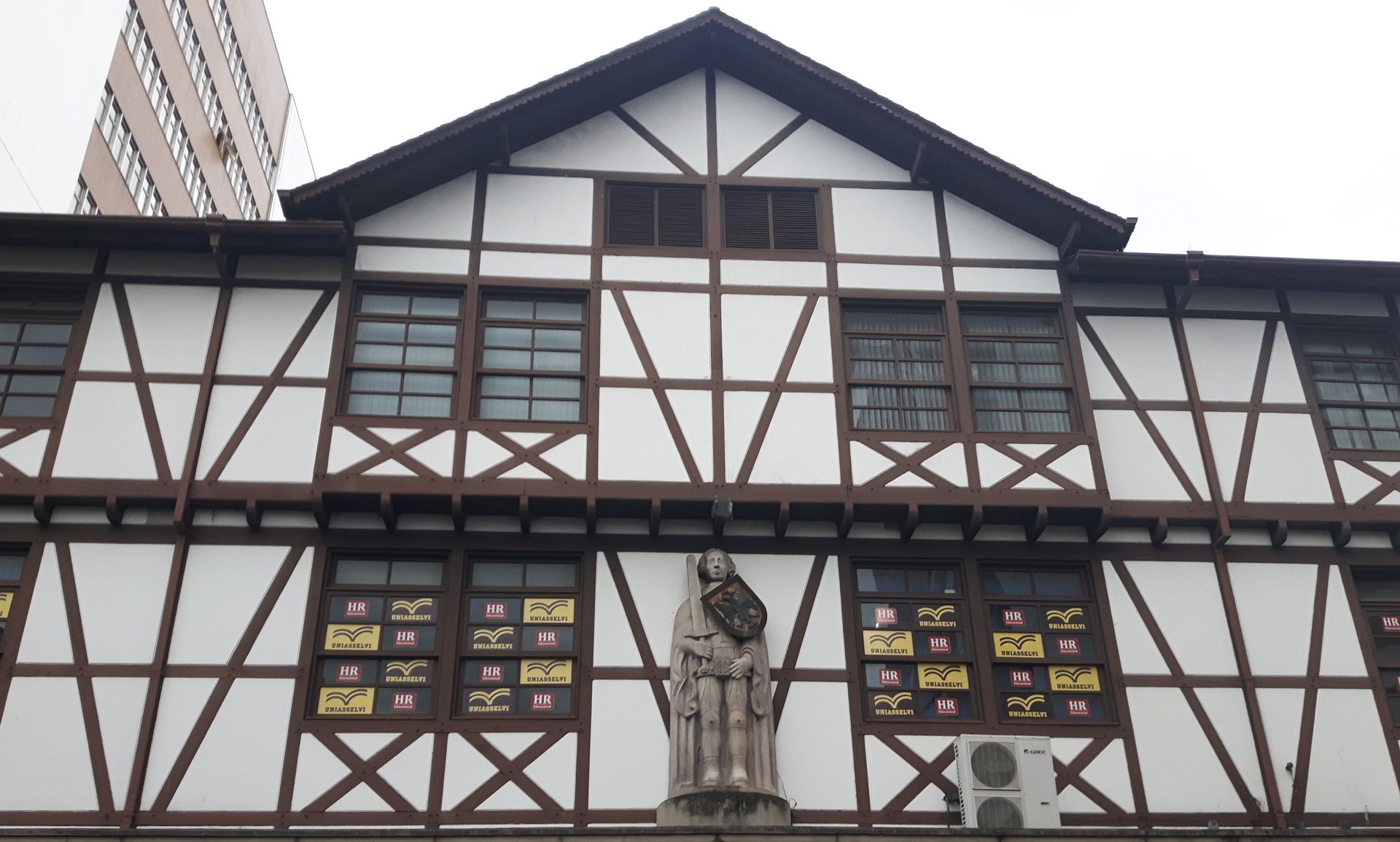
And Roland has to shoulder the Bremen Center
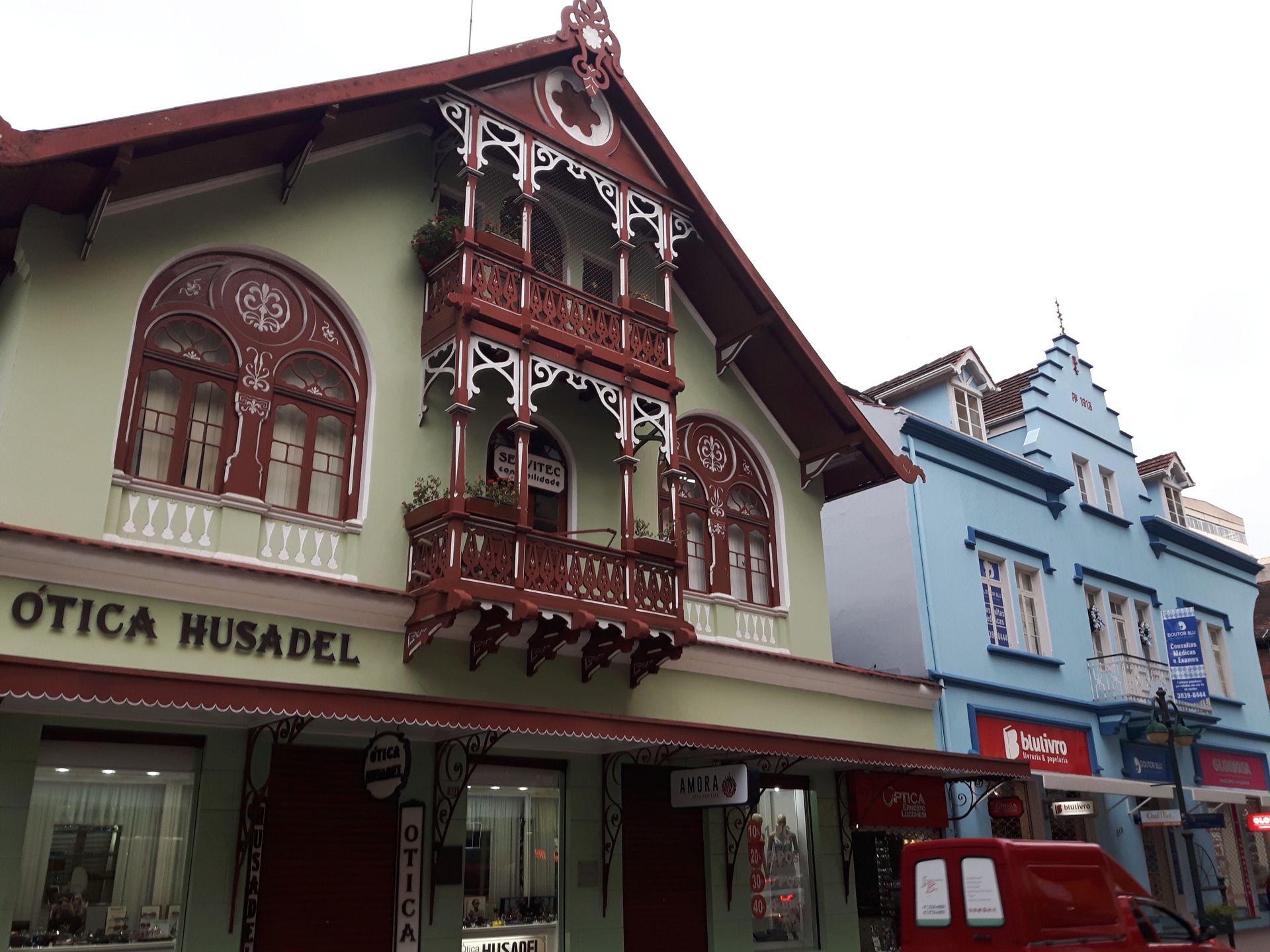
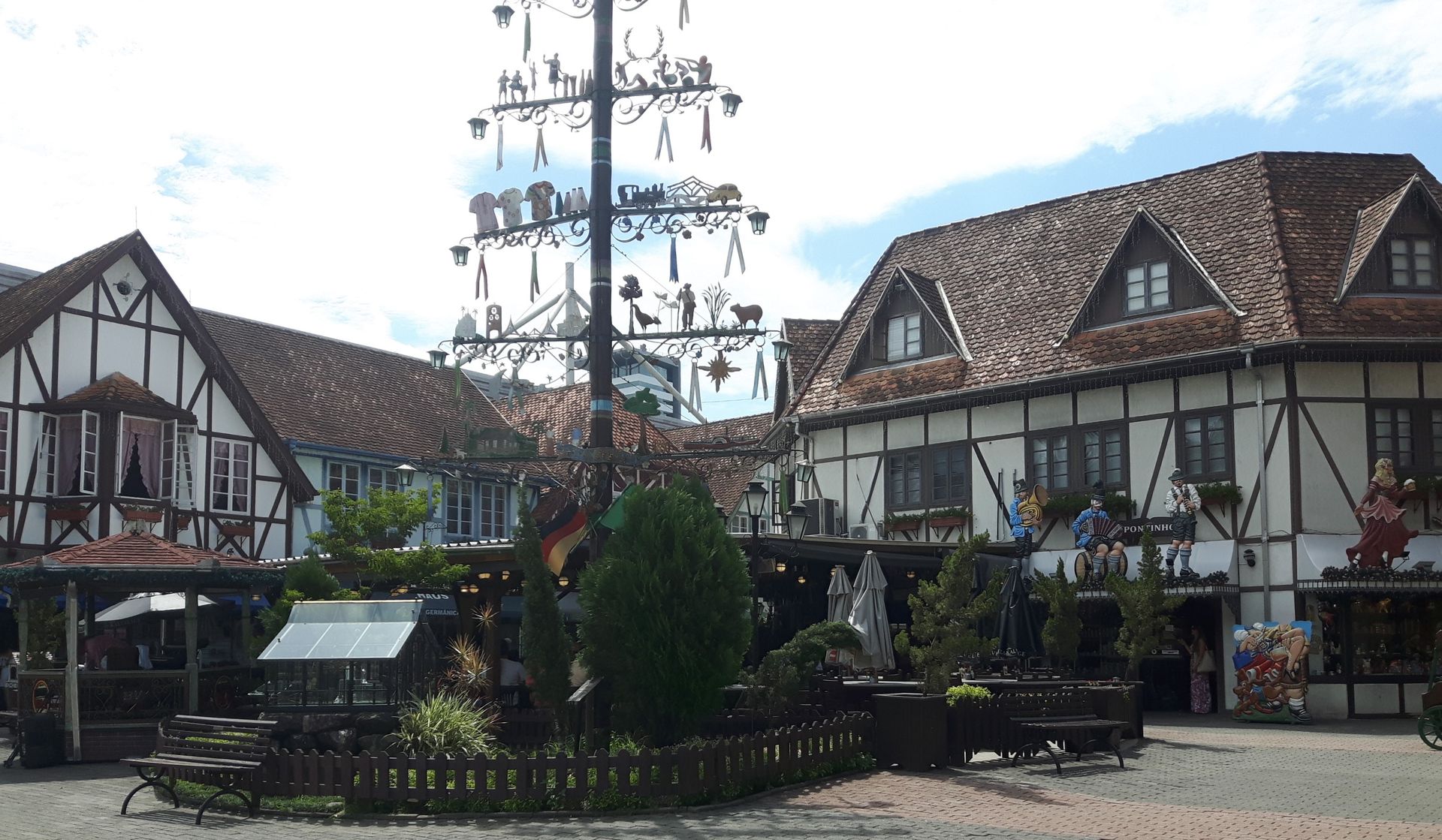
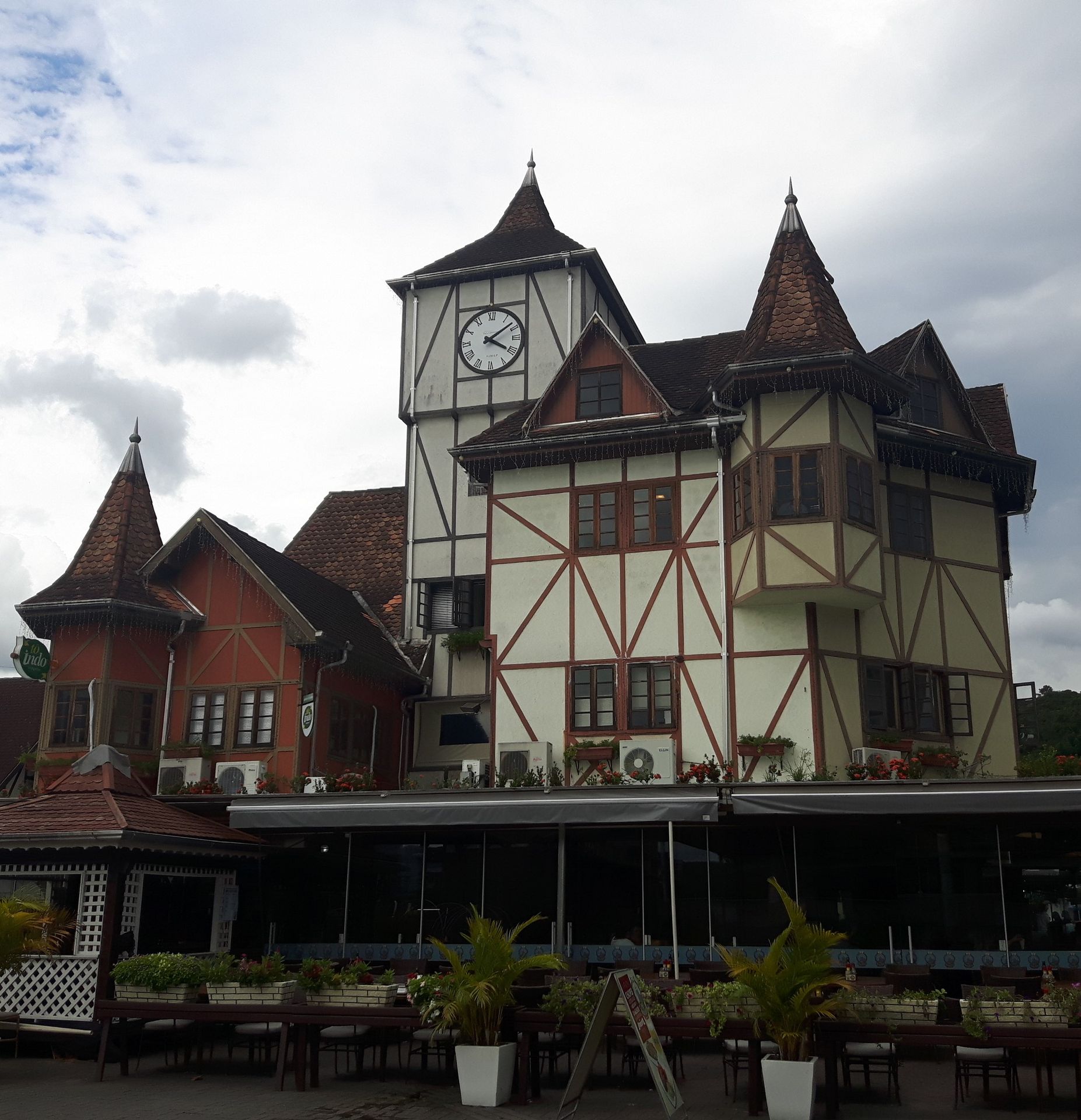
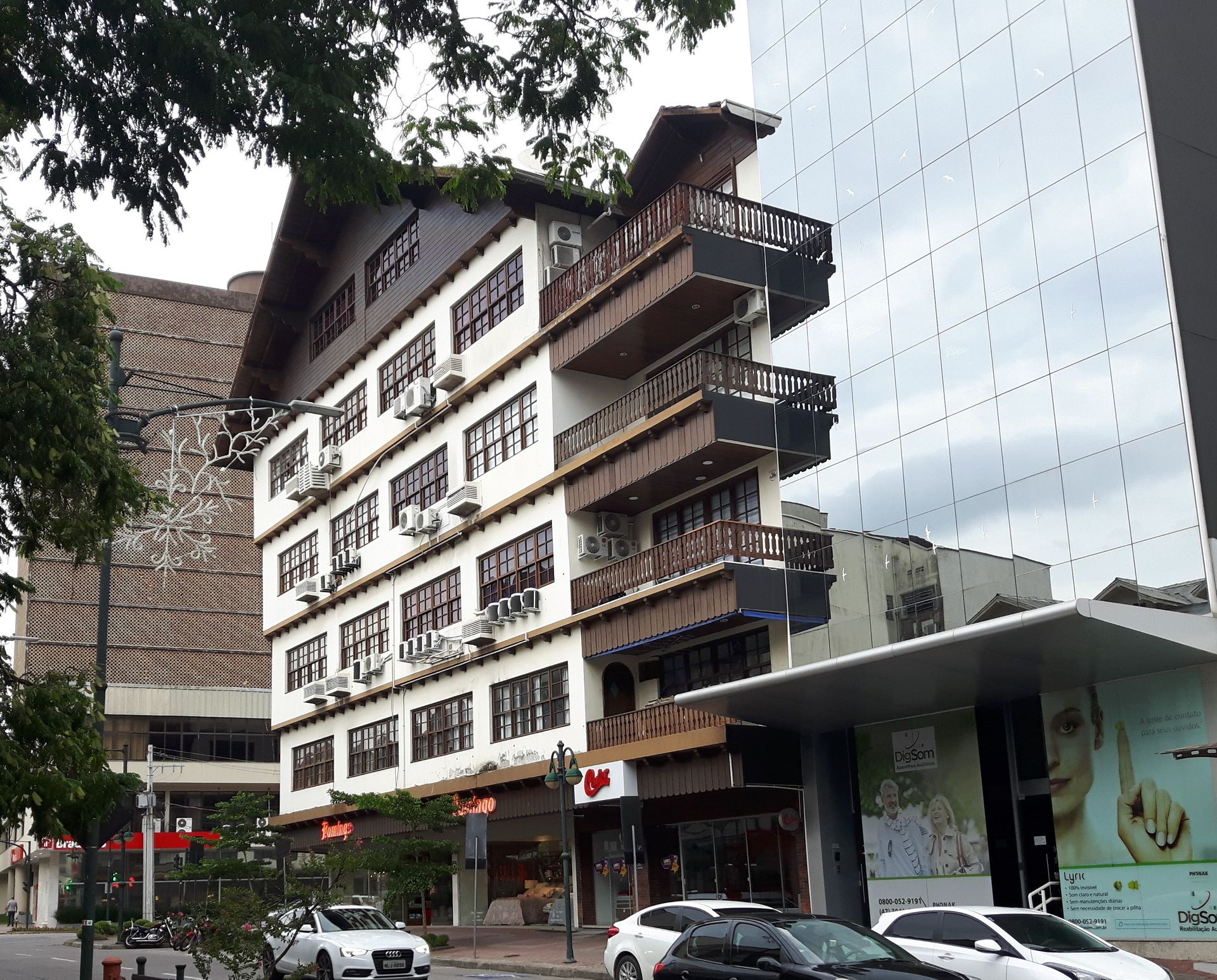
Functional buildings are also necessary - regardless of losses
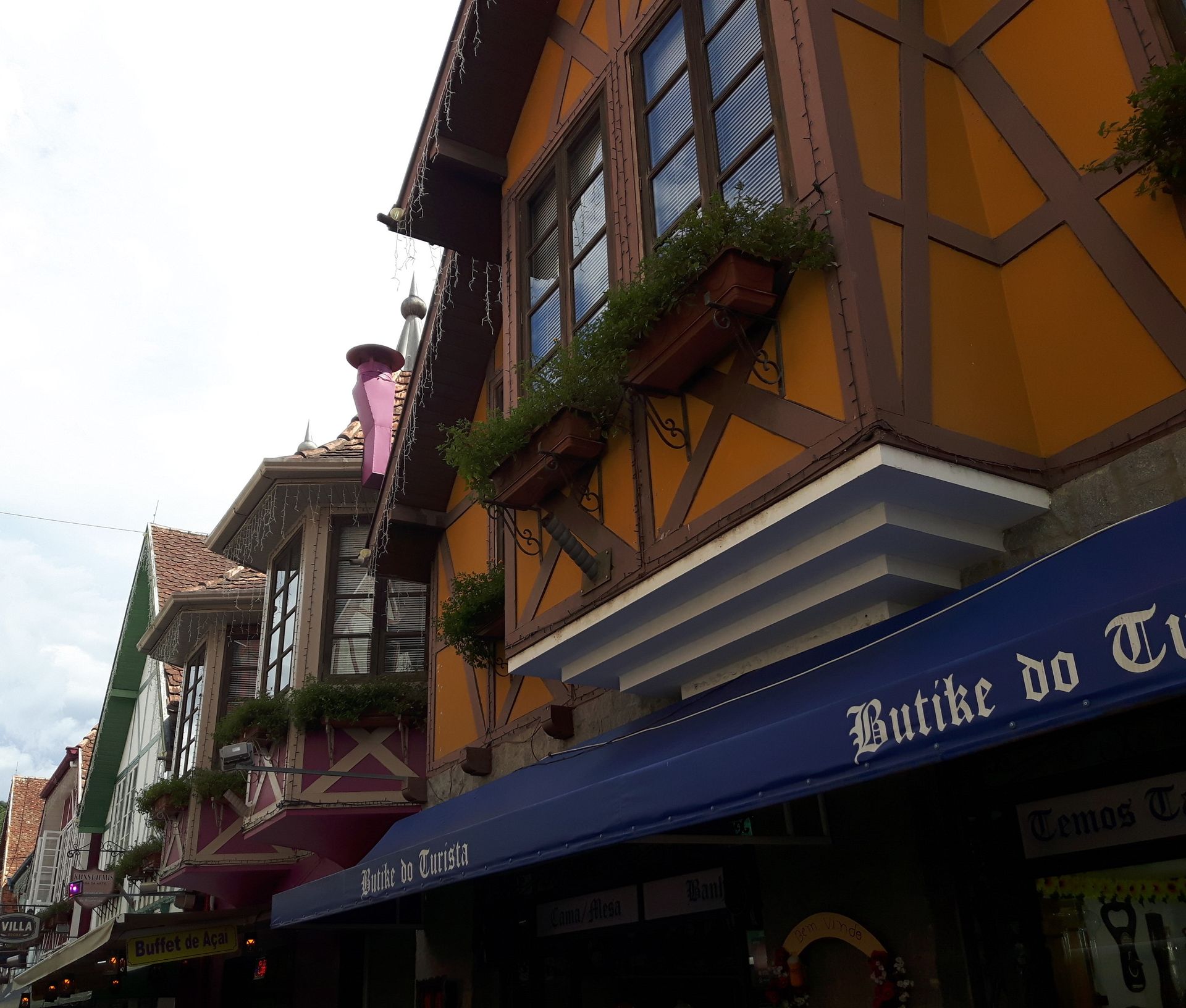
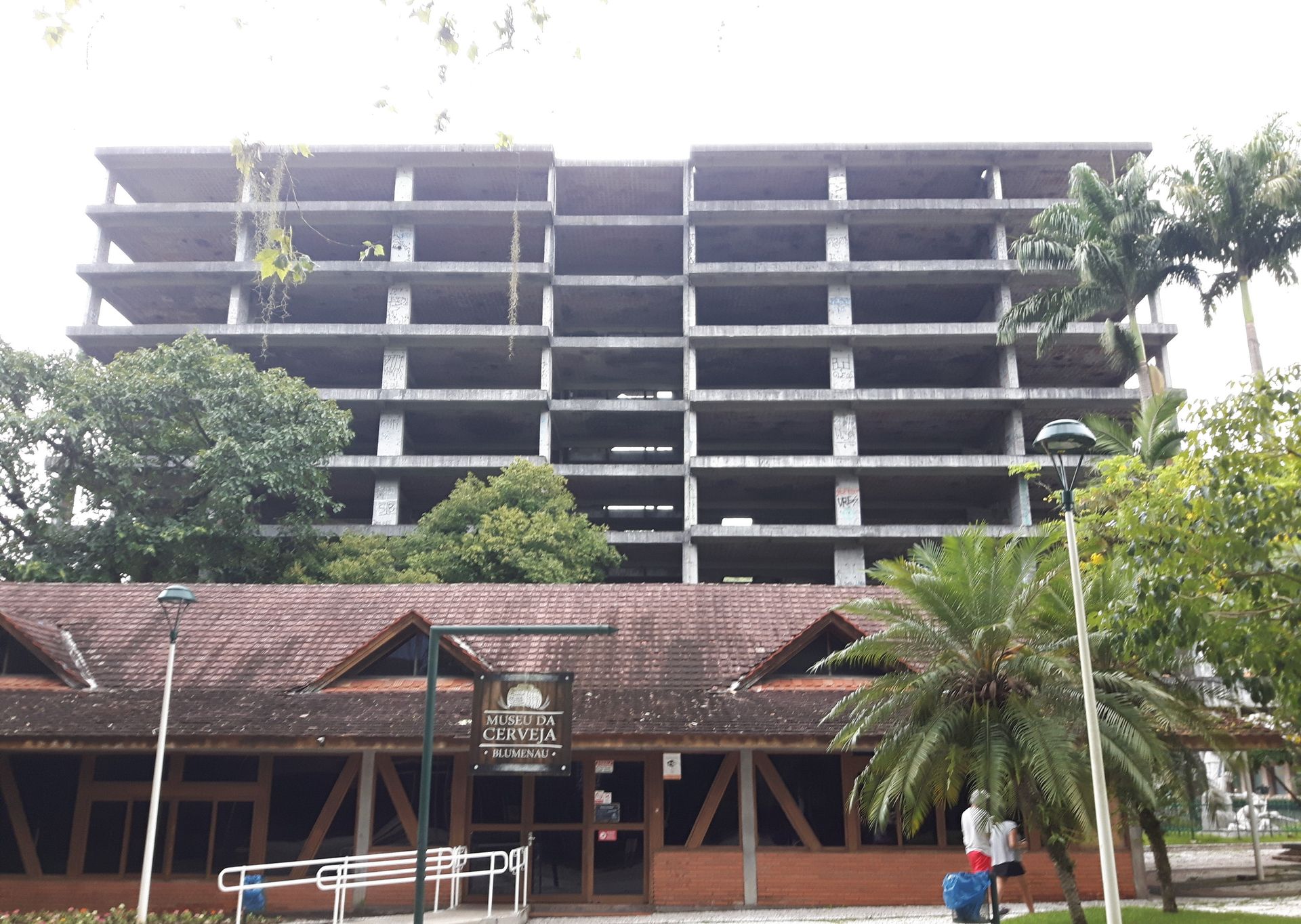
Who greased whom? The taxi driver told me that this architectural sin was built on shallow land near the river. The construction has been stopped for a long time, and no one is taking care of the demolition... well-known from experiences in Germany. There are several of these sins in Blumenau.
I have found a hostel about 3 km from the city center. The prices are affordable again. I quickly find my way to Rua Lidia Zwicker, but arriving at the hostel proves to be a bit more difficult. The road surface consists of large octagonal stones that are starting to crumble in some places. That's not a big problem. But then, after a curve, I see that Rua Lidia Zwicker is steep, very steep. It reminds me of the mountain villages in the Andes. Vespa had to handle inclines of this quality, which she managed only on the second attempt and at full speed. Fortunately, the altitude conditions are different here, and she manages to stay standing from a standstill to my hostel. Parking on a sloping street is a challenge. She must not tip over to the side and must not run away from me. But I have to get off to make myself noticed by my hosts. What will happen? Should she stay outside on the steeply sloping street all weekend? The door opens, and I am given permission for Vespa to stay in the clean and tiled inner courtyard. There's a narrow passageway left since the gate cannot be fully opened for reasons unknown to me. I can't pass through it. I'm sweaty! I stand with Vespa sideways to the steeply sloping street and have to use all my strength to keep myself and Vespa upright and slowly move backward. The idea is to remove the side cases and fold in the side mirrors. Then it might work. Finally, I am facing the road again and look for a place that allows me to get off and is not too far away from my hostel to bring the two side cases up without too much effort. Eventually, I find a less inclined driveway to a very well-kept property. I try my luck there. But Vespa doesn't want to stay still. With all my strength, I put my feet on the road to move Vespa backward and give her a new position millimeter by millimeter. A window opens, and a middle-aged woman of well-groomed appearance cannot understand what I'm doing in her driveway. I could explain it, but she has to be patient. Finally, a carefully tiled wall gives the front wheel support, and Vespa stops. I explain my situation to her but don't engage in conversation. I bring the side cases upstairs, turn Vespa towards the road, and finally, with great effort, guide her through the narrow gate to her place. Done! Tears of relief run down my face like rain. I quickly finish checking in, have some small talk, and take a shower. In the conversation, I learn that it's 42 degrees here. From one extreme to another? We shall see.
My room, with a small window and a whole wall with half-timbered houses from Blumenau, even has air conditioning. It is intended for six people, but I ordered it as private.
If the Oktoberfest takes place here, fair prices will apply, and every bed will be occupied.
The idea for the Oktoberfest came from an emergency situation. The city of Blumenau, with its over 300,000 inhabitants, is located by the Itajai River, which regularly overflows its banks. It is nestled between the mountains in a relatively narrow valley.
In 1961, the Itajai River overflowed, leaving chaos and destruction behind. The then-mayor was saved only by his inventiveness. He used the "unique feature" of the German colony and organized the first Oktoberfest. He managed to find sponsors who helped him make the city accessible again in advance. The success proved him right.
The Oktoberfest is the second most important event for Brazilians after the Carnival in Rio. Everyone flocks to Blumenau. A real success story! It wouldn't surprise me if the mayor had German heritage.
During my siesta, a Spiegel article draws my attention to the town of Pomerode, which is only a few kilometers away.
http://www.spiegel.de/spiegel/print/d-56388075.html
In the late afternoon, I take an Uber taxi again and go to the city center. I imagine what it would be like to eat a traditional Mainz handkäs with music (pickled onions) or a Bavarian obatzda with black bread a little later.
I feel like I'm in a small town in southern Germany or on the Weser River. Somehow, it doesn't fit at all. People speaking Portuguese in an environment that doesn't resemble Brazil at all. But the Brazilians who live and work here belong here. Blumenau is their home.
19.01.:
How long will the German tradition be preserved in Blumenau? We are now in the 5th generation. Today, I asked the Uber driver if she had learned German - unfortunately, no. And her parents? Also no.
Around 1900, the majority of schools taught German as the first language. Although the language was somewhat pushed into the background due to Brazilian internal migration and also due to Polish and Italian immigrants, the Germans made sure that the language was spoken and that their own past was not forgotten through social activities. With the dictator Getulio Vargas, everything foreign was banned under penalty. The German language and everything related to the past - whether books, letters, or pictures - were hidden. From one day to the next, only Portuguese had to be spoken and taught in schools. It's hard to imagine how this was even enforced in practice.
Blumenau and the preservation of German tradition will have to continue for commercial reasons alone.
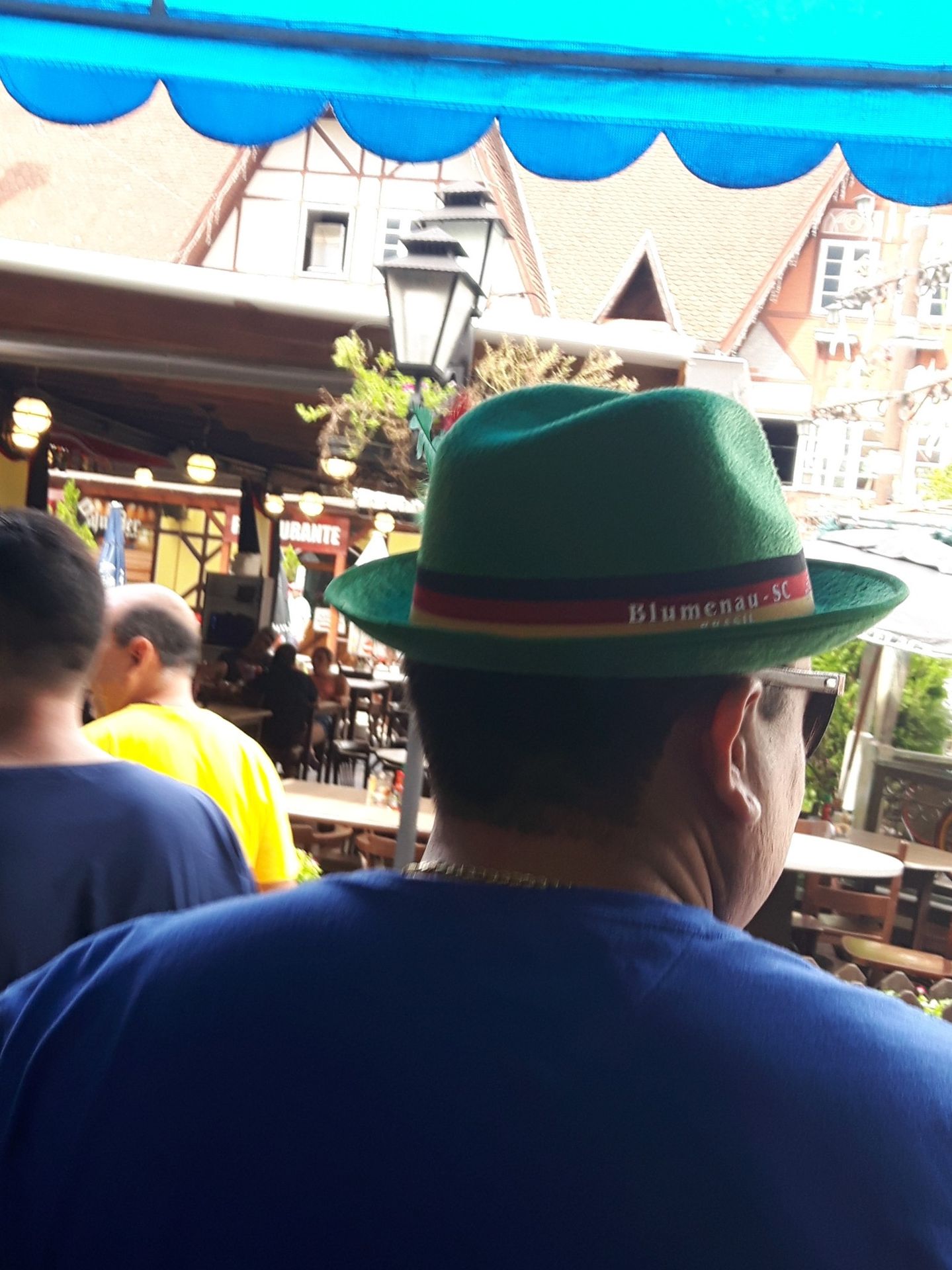
I've already bought the headgear. Unfortunately, the chamois beard is hidden. Now I need the leather pants...
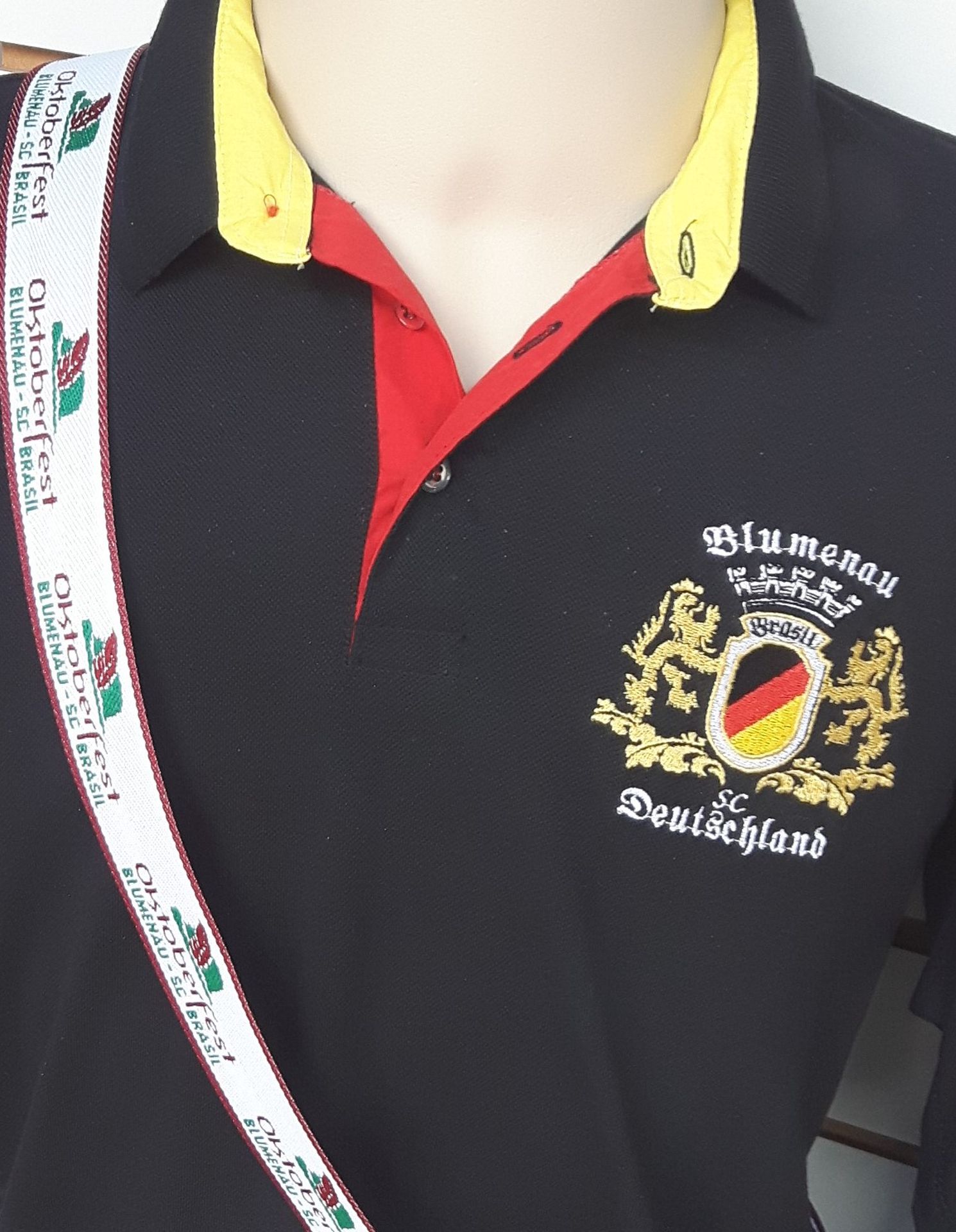
The graphic designer is not quite up to date here...
The Oktoberfest in autumn and the Summer Festival in January - a smaller version - are too important. Everything revolves around these two events. Brazilians who visit Blumenau spend a lot of money here. They flood the retail stores. Everything related to Germany is available for purchase.
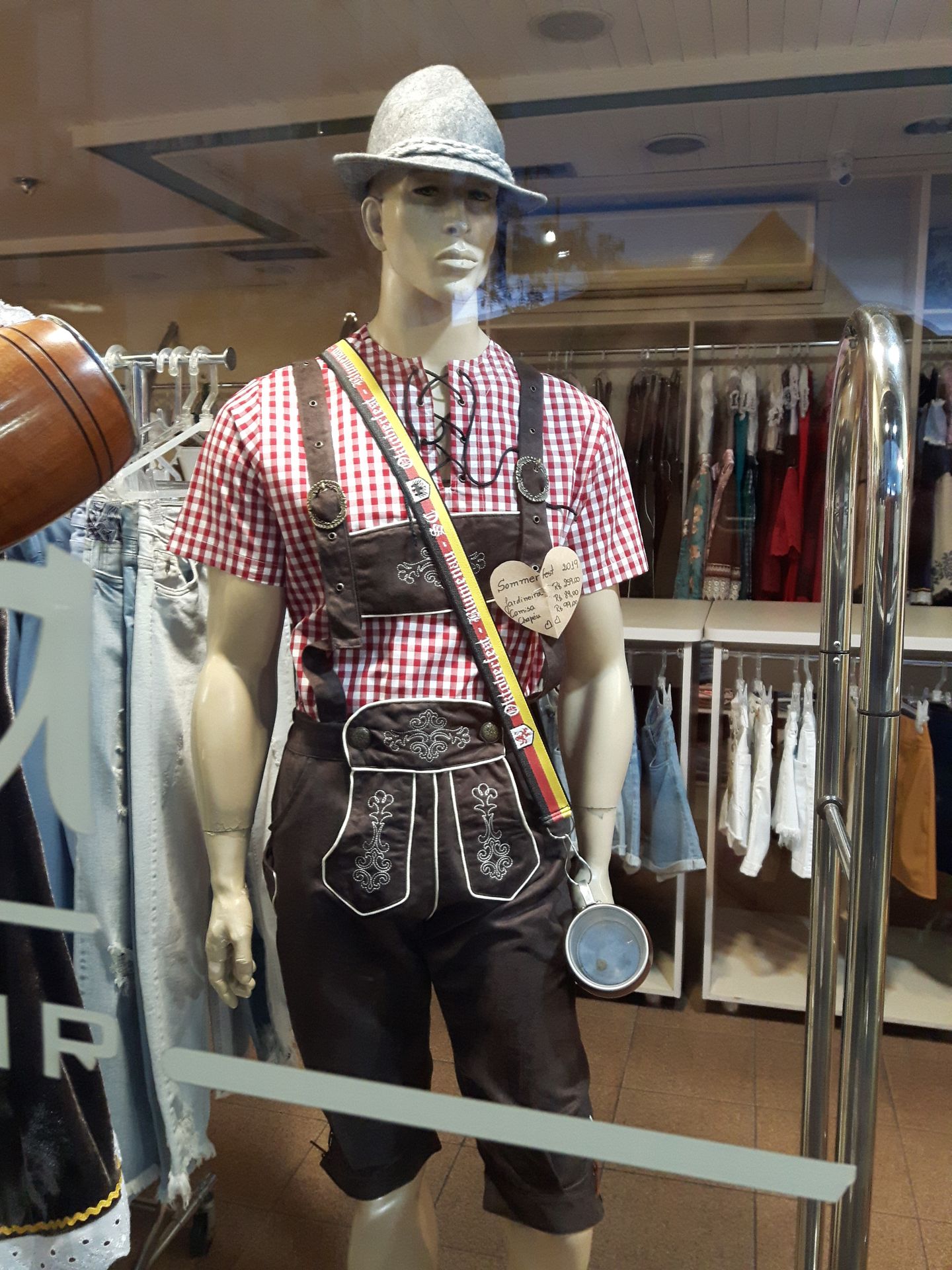
The right wardrobe for men
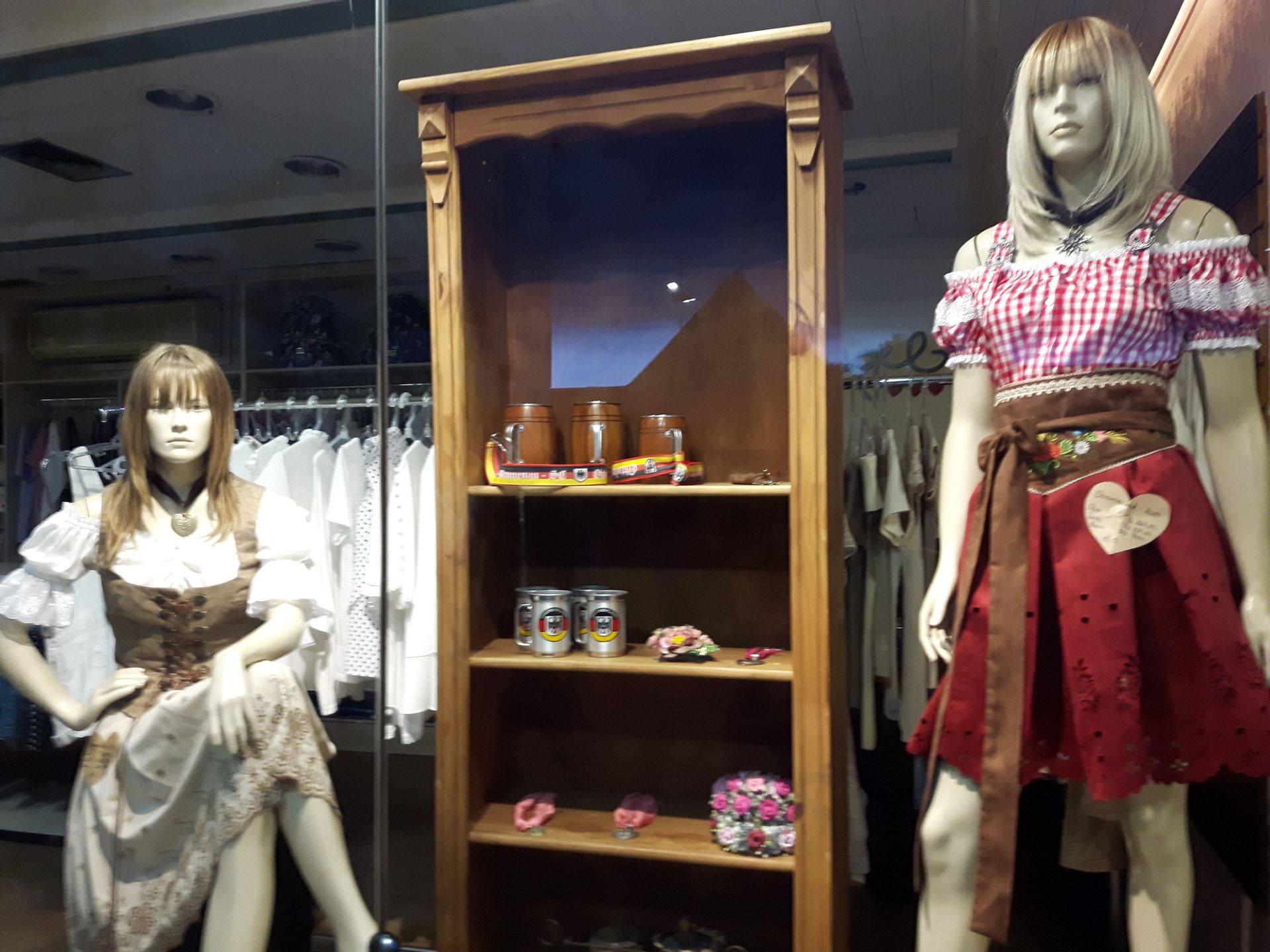
And for ladies
Whether it's cuckoo clocks, weathermen figures, badges with the German flag and coat of arms, mugs with the German flag, T-shirts, lederhosen, or dirndls, everything is available for purchase. The merchandising machinery runs at high speeds. It was the book or the movie for Harry Potter, and here it's the Oktoberfest and the Summer Festival that make the cash registers ring and contribute to the prosperity of this city.
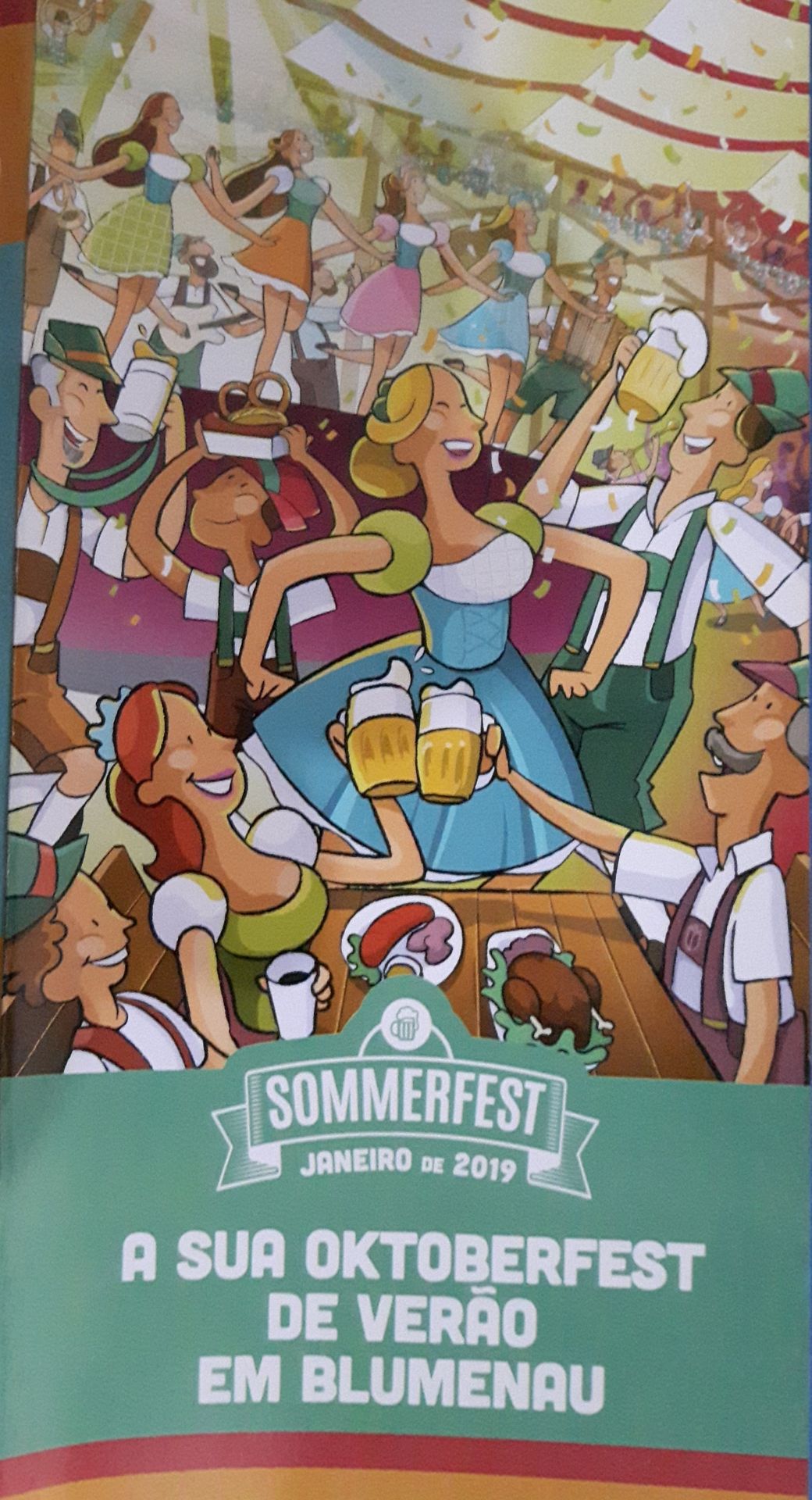
If someone comes here in a T-shirt...
Mario Hildebrandt is the newly elected mayor. Born in 1969. He and his successors must succeed in keeping Blumenau alive in its current form. In addition, there are floods - the last one was in 2008 - which challenge the success story of this city.
I wonder if the pharmacist Hermann Blumenau, born in the Harz region, imagined this? Wikipedia says that his gravestone is in Braunschweig, but his remains were transferred to a mausoleum specially built for him in Blumenau in the 1970s.
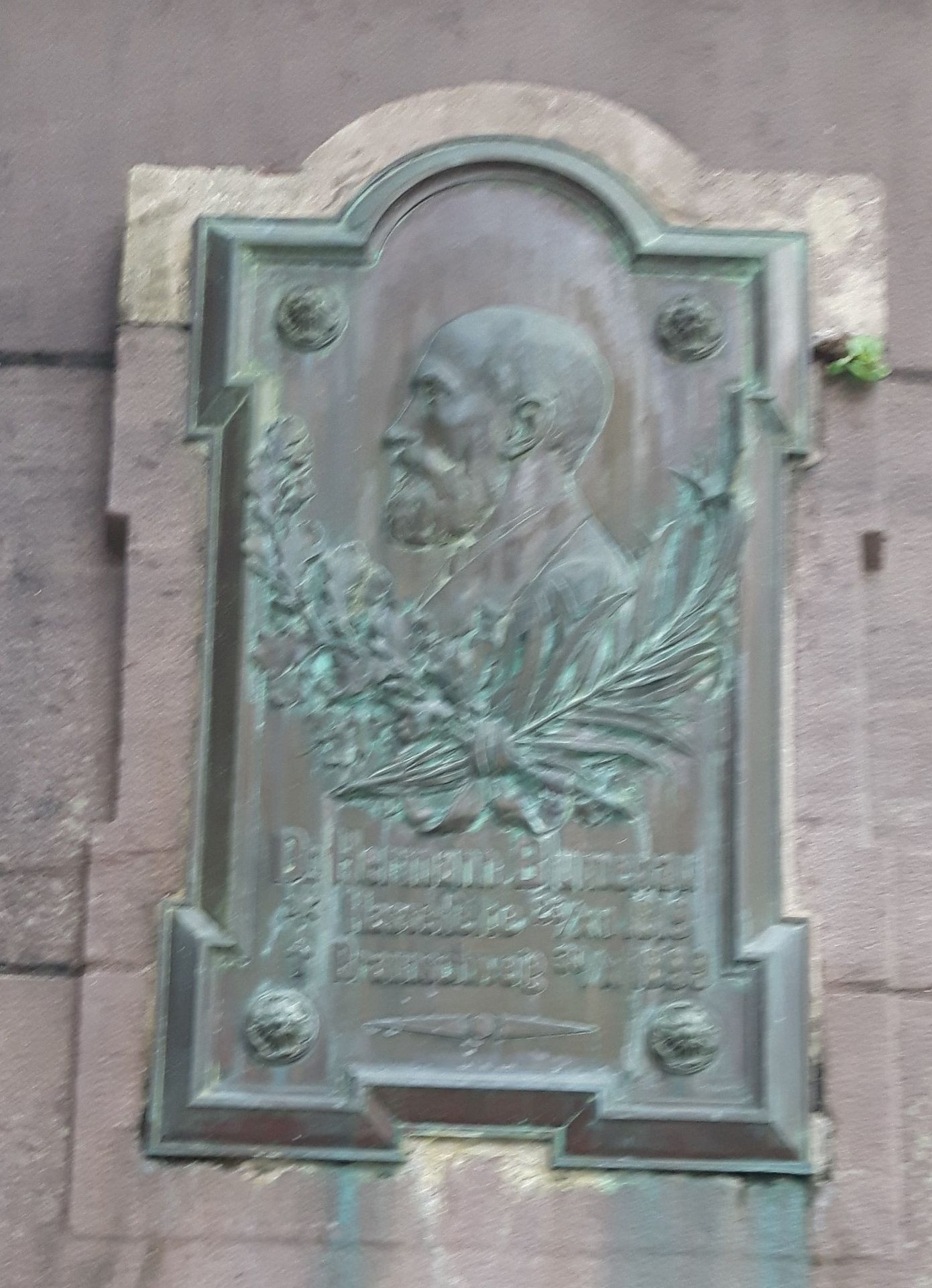
The memorial stone for Hermann Blumenau (1819 - 1899)
The taxi driver takes me to Vila Germanica. That's where the fairgrounds are, and since 2006, the Oktoberfest and the Summer Festival have been taking place there. There are half-timbered houses with restaurants that serve dishes like Kassler and bratwurst. I have a light lasagna, drink a draft beer, and treat myself to an apple streusel cake for dessert, which tastes really good.
I don't need to stay here. The sky darkens again, and the first raindrops send me on my way to Rua Lidia Zwicker - my hostel.
20.01.:
The Hering Museum is closed on Sundays. Very unfortunate. I would have been very interested in the success story of the Hering textile manufacturer, who came from Silesia. Within 120 years, it became one of the largest textile companies in Brazil.
As a memory, I translated the company's history using Google Translate, and I will include it below without any grammatical revision:
Our woven history, which is more than a century old, connects people who dream and realize. People who face the challenge of the new and commit themselves.

http://ciahering.com.br/novo/
Founded as the Tricotwaren Factory Gerbruder Hering in the city of Blumenau, the flight path merges with the saga of the Hering brothers, Hermann and Bruno. As members of a traditional German weaving family, they decided to face the challenge in Brazil. Hermann was the first one to make the decision. Upset by the desire to provide a better life for his children, in 1878 Hermann left his wife Minna in the care of his brother Bruno and crossed the Atlantic. He had everything planned. Before Hermann Hering exchanged Germany for the colony founded by Dr. Hermann Bruno Otto Blumenau in 1850, he had been informed of the possibilities and challenges he would have. Determined, Hermann bought a circular loom and a wire box and began producing the first pieces.
A few months later, Hermann wrote to Minna and asked the couple's children, Paul and Elise, to come to Brazil. They arrived in Brazil in 1879. A year later, Bruno, Minna, and the younger children also arrived in Blumenau. In 1880, the whole family was reunited. In the colony founded by Dr. Blumenau, Hering experienced the difficulties faced by those who wanted to engage in a place with precarious conditions where almost everything was lacking, starting with raw materials.
However, none of this was a reason or obstacle to distance them from their project. Boldness and entrepreneurial spirit have marked all generations and all employees who have made Cia. Hering one of the largest clothing design companies in Brazil over the years. Hering, one of the company's brands, has become one of the most popular and well-known brands among Brazilians, symbolized to this day by the "little fishes".
The ability to reinvent themselves and achieve perfect management are trademarks that have always been present in our hundred-year development. We dress our consumers in all stages of life through the brands Hering, Hering Kids, PUC, and DZARM.
In 1993, we opened our retail business with our first own store. Being entrepreneurs by nature, we soon launched the first franchising store and started an expansion phase to enhance the performance of our brands in the national and international markets. Today, we have 785 stores in Brazil and 20 stores abroad. We are the largest network of clothing stores in Brazil and have differentiated retail capabilities.
In order to maintain economic growth and investment, in 2007, Cia. Hering joined Novo Mercado, currently a B3 stock exchange segment that includes companies with the best corporate governance practices.
Our consumers motivate us to offer better products and services, and they are at the center of our strategy. New technologies and digitalization are already part of everyone's life, and our brands are available to consumers who are increasingly connected and empowered. Through physical stores and e-commerce, we provide a personalized, consistent, and integrated experience as part of our omnichannel strategy.
We engage diverse partners and dress the lives of thousands of people with our casual and authentic style. In this relationship that strengthens daily, we share values and success stories. The satisfaction of those who wear our brands, the development of suppliers, franchisees, representatives, and multi-brand customers, as well as the pride of employees in being part of this network, are results that we value and celebrate.
When I return, I will read Gerhart Hauptmann's book "The Weavers".
Today, I find a natural foods restaurant and treat myself to a salad and acai. A palm fruit that only grows in South America and is said to be very healthy. It resembles our blueberries and is mainly served here as an ice cream with nuts and fruits.
Afterwards, I sit under a tree and read a novel by Sebastian Fitzek. Eventually, the ants come and drive me away. So I settle in a beer garden, drink the good beer from the Eisenbahn Brewery, and enjoy myself.
Tomorrow, I will continue with a detour to Pomerode and then go to Rio do Sul.
Sabskrip to Nyusleta
Ansa
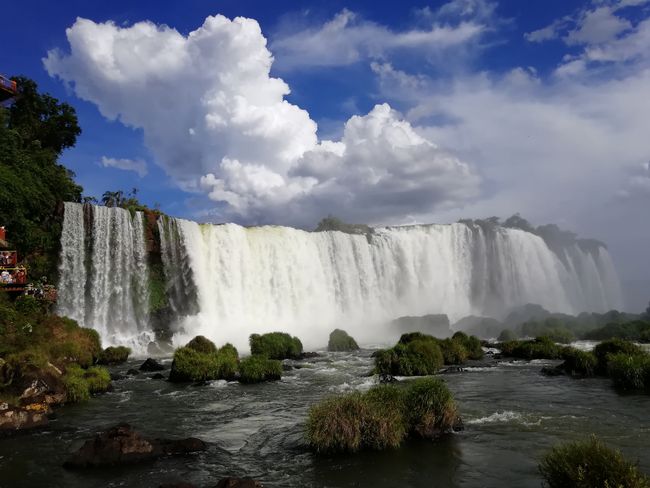
Travul ripɔt Brazil
